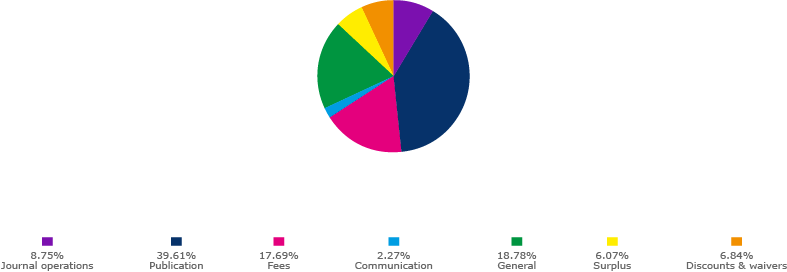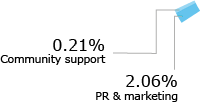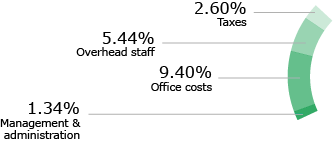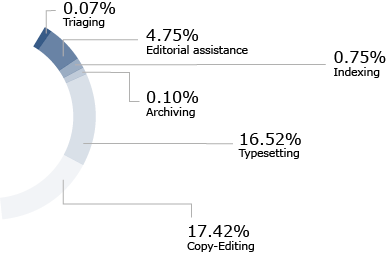APC information
General information
Copernicus Publications is committed to the open-access model of publishing. This ensures free web access to the results of research and maximum visibility for published papers. Authors retain copyright and works are distributed under the CC BY License. However, it requires the author or a supporting institution to pay the publisher's costs of the administration of the review process, typesetting, image processing, language copy-editing, web publication, dissemination, and long-term archiving (via Portico and CLOCKSS) in the form of article processing charges (APCs). Copernicus Publications provides all its services in-house. The current page prices for the individual journals can be found at our APC overview page.
Business model
Most of the journals we publish are owned by learned societies and other scientific institutions. These journal owners can decide whether they want to subsidize their journal(s) by covering the costs of our services entirely or partly (no APCs for authors or APCs smaller than the costs of our services); they can forward the costs of our services to the authors and thereby break even (APCs = costs of our service); or they can decide to generate some income for their own community activities by adding an amount x to the amount of our service fee (APCs for authors higher than the costs of our services).
APC breakdown on publisher's level
The following APC breakdown represents an average of all journals we publish (please note that the breakdown scheme suggested by the FAIR Open Access Alliance (FOAA) is applied):

Breakdown elements
Journal operations
- Infrastructure: all journals we publish have their own web domain, and the server infrastructure is owned and maintained by Copernicus Publications. Therefore, this element refers to all technical infrastructure costs.
- IT staff: the editorial support system we use to facilitate the peer-review process, the Copernicus Office Editor, is an in-house development. The same applies to our production system, our library management, as well as our article and metadata distribution processes.
Publication
- Triaging: the editorial decisions are completely in the hands of the editors, active scientists who dedicate voluntary, unpaid time to the journals. However, all articles submitted to the journals we publish undergo a plagiarism check through Similarity Check. These costs are included in triaging.
- Editorial assistance: several technical checks of the submitted manuscript files, clarification of copyrights and licences, and the personal editorial assistance regarding the review system are carried out by our in-house team in Editorial Support.
- Indexing: all articles we publish receive a DOI through Crossref. Furthermore, we provide an ORCID integration, enabling authors to connect their works to their ORCID record. We aim to distribute the articles as widely as possible. In order to control whether the articles are indexed appropriately, we subscribe to some of the major databases.
- Archiving: long-term archiving is a crucial aspect in (open-access) online publishing. We archive all articles with Portico and CLOCKSS. In addition, we also provide all content to the German National Library, the Gottfried Wilhelm Leibniz Bibliothek (state library of Lower Saxony), and the Library of Congress.
- Typesetting: we standardize the (mathematical) content and the structuring of the text, tables, figures, and equations for a media-neutral conversion into XML/MathML (NLM 3.0) in-house through a team of Typesetters. We thereby apply the IUPAC–IUPAP guidelines and use LaTex before XML conversion. This typesetting is complemented by our in-house image processing to enhance the quality of the figures. Furthermore, this breakdown element also counts the working time spent on inserting and clarifying proofreading corrections that are iterated until the author approves the publication.
- Copy-editing: as English native speakers with backgrounds in linguistics and/or the sciences, our team of in-house Copy Editors ensures that all articles adhere to scientific writing standards, grammatical accuracy, and overall readability.
Fees
- Licence fee: we work with licence contracts. The society/institution that owns the journal is the licenser and Copernicus is the licensee. If a society decides to generate income (see above) from their journal(s), they receive this income through an annually paid licence fee.
Communication
- PR & marketing: we create promotional material for the journals and present them at various events throughout the year. In addition, we maintain the journals' Twitter accounts and news sections.
- Community support: we are member of various organizations that promote best practices in (open-access) publishing. We are a founding member of the Open Access Scholarly Publishers Association (OASPA), we are a member of the Committee on Publication Ethics (COPE), and we are a supporter of the Directory of Open Access Journals (DOAJ). Furthermore, we support organizations and initiatives that foster scientific exchange and the promotion of science through donations.
General
- Management & administration: staff costs of management and administrative staff members, including accounting and HR.
- Office costs: payments for office rental, associated costs (electricity, water, etc.), furniture, and other technical and office equipment.
- Overhead staff: staff costs of any other staff members not directly involved in the journal article handling and production and not listed in the former staff cost categories.
- Taxes: the corporate and local business taxes on the surplus.
Surplus
- After taxes: Copernicus Publications is owned by a German non-profit association, the Copernicus e.V., as described in our legal status. Any surplus generated is either used to support the activities of the association, for investments in new staff and the enhancement of our services, or for our own outreach activities, such as the journals Earth System Science Data, History of Geo-and Space Sciences, and Advances in Statistical Climatology, Meteorology and Oceanography, which are owned by Copernicus and do not have APCs.










